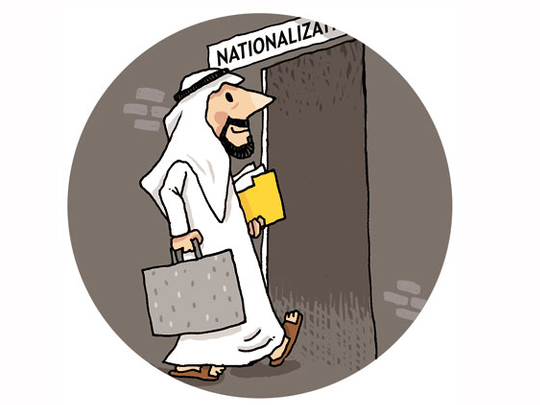
In the corridors of the labour ministries of regional governments, there is creeping awareness and concern on the issues of nationalisation, a process by which nationals are systematically prepared to replace expatriates at various key industries and levels. We've all heard of Saudisation, Emiratisation, Omanisation and the like; buzzwords that have slowly crept into the national psyche. The obvious target is to achieve a respectable level of employment for a budding national labour force.
But nowhere in the region has this awareness manifested into a serious concern as in Saudi Arabia, the regional economic heavyweight.
Faced with a booming population and a rising number of the unemployed especially among the youth, the matter has begun to warrant more than a passing interest to get nationals on to the labour workforce.
Along those lines, at a recent consular function in Jeddah, I bumped into an old acquaintance of mine, one whom I hadn't seen for well over a decade, Lars Svenson.
We sat down and began to catch up on our activities over the last 10 years.
"Lars, last I saw you, you were a foreman of a road construction outfit or something. After we lost touch, I was so sure that you had finally packed it in and left for the fjords of Norway. What have you been doing with your life all this time?"
Slyly and with a smug look, he reached into the inside pocket of his jacket and handed me his business card: ‘Lars Svenson, Director of Human Resources, XYZ Manufacturing Company'.
He went on to explain that this was a local company and he had been fortunate to fall into it after contracts for roadworks had pretty much dried out midway into the last decade.
XYZ hired him, smoothed out his rough edges, and after several training seminars and symposiums here and abroad, managed to turn him into an executive. He felt very fortunate to be with them.
Currently he was monitoring a Saudisation programme for the company, that he had developed and begun implementing some time back, and in fact had in the past two years increased the percentage of nationals by a whole 13 per cent!
"Thirteen per cent in two years?" was my incredulous reply, not knowing whether statistically that was a commendable figure or not.
"Yes," was his beaming response. He went on to say that with the programme he had studied and developed, the company would be 100 per cent nationalised by 2016.
Curiosity sets in
Why 2016, I wanted to know. What was the significance of that particular year?
He would be near retirement by then, he continued, and it would be fitting if he were to be the last expatriate out of the door of XYZ.
"Well, tell me about this 13 per cent," I enquired. Were they success stories so far? Had they managed to absorb their responsibilities and to contribute effectively, I wanted to know. Just who and how far up the company structure were they? And how many heads did 13 per cent translate into?
Initially, there were eleven in the group, but three had dropped out because of mediocre effort or lack of interest, he explained. The remaining totalled eight. He had picked them out carefully after several interviews, assigned them to their expatriate counterparts and monitored them.
Once they had successfully demonstrated that they were capable of managing their tasks competently, notices of termination were given to their counterparts who subsequently left for their home countries.
The company did not show any drop in performance of profits, and while Lars' Saudi superiors were not too keen to observe or understand his programme, they were pleased with the percentages. It would look good in their annual report to the Ministry of Labour.
"Very impressive, Lars, But tell me… who are these accomplished guys… lower or mid-management staff perhaps..?"
"No, no, no… Tariq", he responded. "My programme is designed to start at grass roots level. Of the eight, two are secretaries, one a typist and the remaining five are tea boys!"
I must say that I am rarely at a loss for words, but in my stunned and confused state, it must have taken me some great effort to get up and walk away quietly.
Tariq A. Al Maeena is a Saudi socio-political commentator. He lives in Jeddah, Saudi Arabia.








